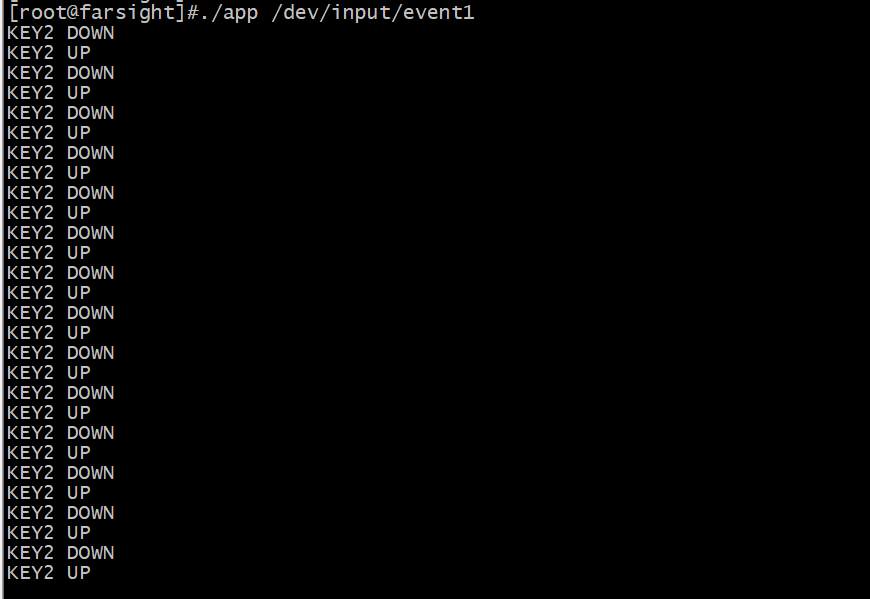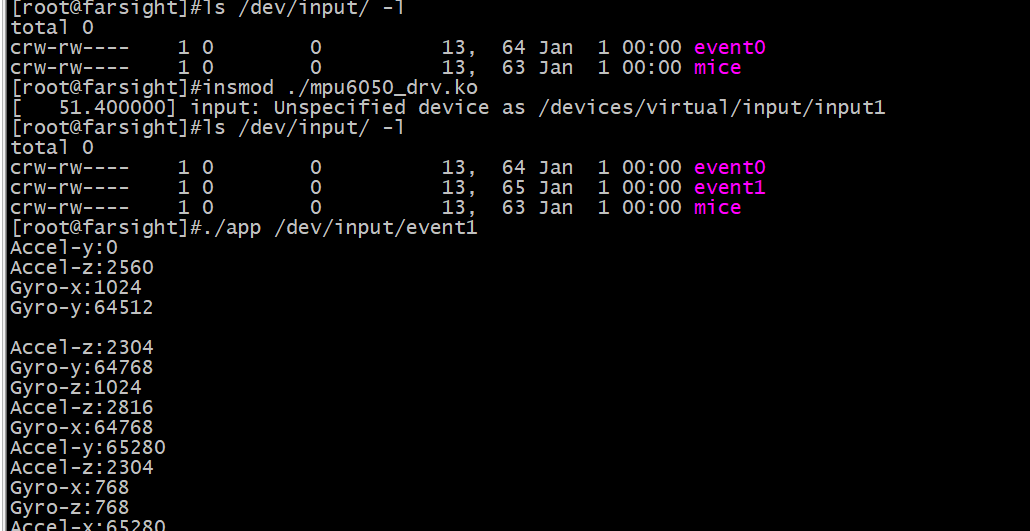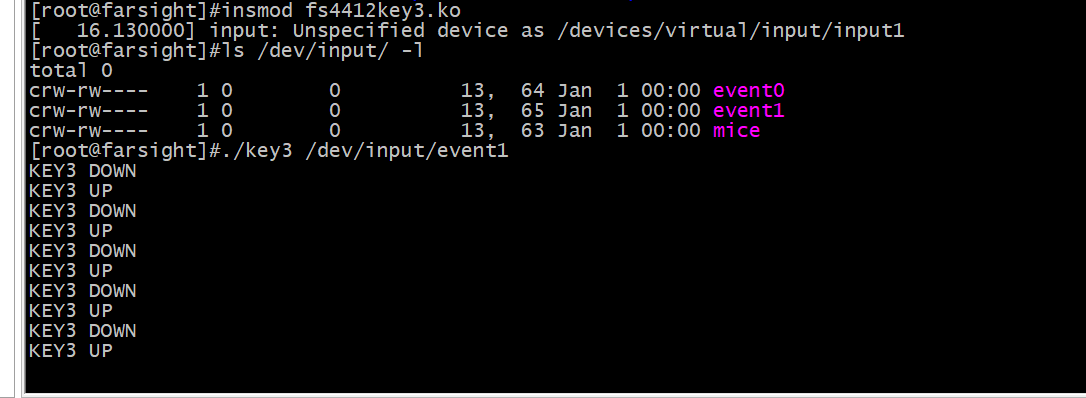目录
一、input子系统基本框架
Linux内核为了两个目的:
1. 简化纯输入类外设(如:键盘、鼠标、游戏杆、轨迹球、触摸屏。。。等等)的驱动开发
2. 统一输入类外设产生的数据格式(struct input_event),更加方便应用层编程
设计了输入子系统

Linux一般把输入类外设产生的数据叫做事件
事件处理层:接收来自核心层上报的事件,并选择对应的handler(事件处理器 struct input_handler)去处理。内核维护着多个事件处理器对象,每个input_handler对象专门处理一类事件,所有产生同类事件的设备驱动共用同一个handler。
设备驱动层:主要实现获取硬件设备的数据信息(包括触摸屏被按下、按下位置、鼠标移动、键盘按下等等),并转换为核心层定义的规范事件后提交给核心层,该层每个设备对应一个struct input_dev对象,
核心层:负责连接设备驱动层和事件处理层,为设备驱动层提供输入设备驱动的接口(struct input_dev)以及输入设备驱动的注册函数(input_register_device),为事件处理层提供输入事件驱动的接口;通知事件处理层对事件进行处理。
二、驱动开发步骤
```c /*init或probe函数中: 1. 创建struct input_dev对象input_allocate_device 2. 设置事件类型以及相关参数set_bit 3. 注册struct input_dev对象input_register_device */ /*exit或remove函数中: 1. 注销struct input_dev对象input_unregister_device 2. 销毁struct input_dev对象input_free_device */ /*上报事件 两种事件上报方式: 1. 对有中断支持的输入设备:在其中断处理函数(上半部或下半部)中上报事件 2. 对无中断支持的输入设备:使用workqueue循环定时上报(struct delayed_work) 主要函数: input_event input_report_abs input_sync */ ```
相关接口:
```c /*_init*/ struct input_dev *input_allocate_device(void)//创建对象 void set_bit(struct input_dev *dev,unsigned long whichbits)//设置事件类型 void input_set_abs_params(struct input_dev *dev,unsigned int axis,int min,int max,int fuzz,int flat) int input_register_device(struct input_dev *dev)//注册input设备到内核 /*_exit*/ void input_unregister_device(struct input_dev *dev) void input_free_device(struct input_dev *dev) /*上报事件*/ void input_event(struct input_dev *,unsigned int t,unsigned int c,int v) void input_report_key(struct input_dev *,unsigned int c,int v) //上报按键事件 void input_report_abs(struct input_dev *,unsigned int c,int v)//上报绝对坐标事件 void input_sync(struct input_dev *)//上报完成后需要调用这些函数来通知系统处理完整事件 /*应用层数据类型*/ struct input_event { struct timeval time; // 时间戳 __u16 type; // 事件类型 __u16 code; // 哪个分值 __s32 value; // 具体值 }; ```
三、key2-input版代码解析

#include <linux/module.h>
#include <linux/kernel.h>
#include <linux/fs.h>
#include <linux/gpio.h>
#include <linux/interrupt.h>
#include <linux/of_gpio.h>
#include <linux/of_irq.h>
#include <linux/cdev.h>
#include <linux/wait.h>
#include <linux/sched.h>
#include <linux/poll.h>
#include <linux/mm.h>
#include <linux/input.h>
#include <linux/delay.h>
#include <linux/slab.h>
#include <asm/uaccess.h>
struct fs4412key2_dev
{
struct input_dev *pdev;
int gpio;
int irqno;
};
struct fs4412key2_dev *pgmydev = NULL;
irqreturn_t key2_irq_handle(int no,void *arg)
{
struct fs4412key2_dev *pmydev = (struct fs4412key2_dev *)arg;
int status1 = 0;
int status2 = 0;
status1 = gpio_get_value(pmydev->gpio);
mdelay(1);
status2 = gpio_get_value(pmydev->gpio);
if(status1 != status2)
{
return IRQ_NONE;
}
if(status1)
{
input_event(pmydev->pdev,EV_KEY,KEY_2,0);
input_sync(pmydev->pdev);
}
else
{
input_event(pmydev->pdev,EV_KEY,KEY_2,1);
input_sync(pmydev->pdev);
}
return IRQ_HANDLED;
}
int __init fs4412key2_init(void)
{
int ret = 0;
struct device_node *pnode = NULL;
pnode = of_find_node_by_path("/mykey2_node");
if(NULL == pnode)
{
printk("find node failed\n");
return -1;
}
pgmydev = (struct fs4412key2_dev *)kmalloc(sizeof(struct fs4412key2_dev),GFP_KERNEL);
if(NULL == pgmydev)
{
printk("kmallc for struct fs4412key2_dev failed\n");
return -1;
}
pgmydev->gpio = of_get_named_gpio(pnode,"key2-gpio",0);
pgmydev->irqno = irq_of_parse_and_map(pnode,0);
pgmydev->pdev = input_allocate_device();
set_bit(EV_KEY,pgmydev->pdev->evbit);
set_bit(KEY_2,pgmydev->pdev->keybit);
ret = input_register_device(pgmydev->pdev);
ret = request_irq(pgmydev->irqno,key2_irq_handle,IRQF_TRIGGER_FALLING | IRQF_TRIGGER_RISING,"fs4412key2",pgmydev);
if(ret)
{
printk("request_irq failed\n");
input_unregister_device(pgmydev->pdev);
input_free_device(pgmydev->pdev);
kfree(pgmydev);
pgmydev = NULL;
return -1;
}
return 0;
}
void __exit fs4412key2_exit(void)
{
free_irq(pgmydev->irqno,pgmydev);
input_unregister_device(pgmydev->pdev);
input_free_device(pgmydev->pdev);
kfree(pgmydev);
pgmydev = NULL;
}
MODULE_LICENSE("GPL");
module_init(fs4412key2_init);
module_exit(fs4412key2_exit);
#include <sys/types.h>
#include <sys/stat.h>
#include <linux/input.h>
#include <fcntl.h>
#include <unistd.h>
#include <stdio.h>
int main(int argc,char *argv[])
{
int fd = -1;
struct input_event evt;
if(argc < 2)
{
printf("Argument is too few\n");
return 1;
}
/*open*/
fd = open(argv[1],O_RDONLY);
if(fd < 0)
{
printf("open %s failed\n",argv[1]);
return 2;
}
/*init mpu6050*/
while(1)
{
read(fd,&evt,sizeof(evt));
if(evt.type == EV_KEY && evt.code == KEY_2)
{
if(evt.value)
{
printf("KEY2 DOWN\n");
}
else
{
printf("KEY2 UP\n");
}
}
}
/*close*/
close(fd);
fd = -1;
return 0;
}
四、mpu6050-input版代码解析

#include <linux/module.h>
#include <linux/kernel.h>
#include <linux/fs.h>
#include <linux/i2c.h>
#include <linux/cdev.h>
#include <linux/wait.h>
#include <linux/sched.h>
#include <linux/poll.h>
#include <linux/slab.h>
#include <linux/mm.h>
#include <linux/input.h>
#include <linux/io.h>
#include <asm/uaccess.h>
#include <asm/atomic.h>
#define SMPLRT_DIV 0x19
#define CONFIG 0x1A
#define GYRO_CONFIG 0x1B
#define ACCEL_CONFIG 0x1C
#define ACCEL_XOUT_H 0x3B
#define ACCEL_XOUT_L 0x3C
#define ACCEL_YOUT_H 0x3D
#define ACCEL_YOUT_L 0x3E
#define ACCEL_ZOUT_H 0x3F
#define ACCEL_ZOUT_L 0x40
#define TEMP_OUT_H 0x41
#define TEMP_OUT_L 0x42
#define GYRO_XOUT_H 0x43
#define GYRO_XOUT_L 0x44
#define GYRO_YOUT_H 0x45
#define GYRO_YOUT_L 0x46
#define GYRO_ZOUT_H 0x47
#define GYRO_ZOUT_L 0x48
#define PWR_MGMT_1 0x6B
struct mpu6050_dev
{
struct input_dev * pinput;
struct i2c_client *pclient;
struct delayed_work work;
};
struct mpu6050_dev *pgmydev = NULL;
int mpu6050_read_byte(struct i2c_client *pclt,unsigned char reg)
{
int ret = 0;
char txbuf[1] = {reg};
char rxbuf[1] = {0};
struct i2c_msg msg[2] =
{
{pclt->addr,0,1,txbuf},
{pclt->addr,I2C_M_RD,1,rxbuf}
};
ret = i2c_transfer(pclt->adapter,msg,ARRAY_SIZE(msg));
if(ret < 0)
{
printk("ret = %d,in mpu6050_read_byte\n",ret);
return ret;
}
return rxbuf[0];
}
int mpu6050_write_byte(struct i2c_client *pclt,unsigned char reg,unsigned char val)
{
int ret = 0;
char txbuf[2] = {reg,val};
struct i2c_msg msg[1] =
{
{pclt->addr,0,2,txbuf},
};
ret = i2c_transfer(pclt->adapter,msg,ARRAY_SIZE(msg));
if(ret < 0)
{
printk("ret = %d,in mpu6050_write_byte\n",ret);
return ret;
}
return 0;
}
void mpu6050_work_func(struct work_struct *pwk)
{
struct mpu6050_dev *pmydev = container_of((struct delayed_work *)pwk,struct mpu6050_dev,work);
unsigned short ax = 0;
unsigned short ay = 0;
unsigned short az = 0;
unsigned short gx = 0;
unsigned short gy = 0;
unsigned short gz = 0;
unsigned short temp = 0;
ax = mpu6050_read_byte(pmydev->pclient,ACCEL_XOUT_L);
ax = mpu6050_read_byte(pmydev->pclient,ACCEL_XOUT_H) << 8;
input_report_abs(pmydev->pinput,ABS_X,ax);
ay = mpu6050_read_byte(pmydev->pclient,ACCEL_YOUT_L);
ay = mpu6050_read_byte(pmydev->pclient,ACCEL_YOUT_H) << 8;
input_report_abs(pmydev->pinput,ABS_Y,ay);
az = mpu6050_read_byte(pmydev->pclient,ACCEL_ZOUT_L);
az = mpu6050_read_byte(pmydev->pclient,ACCEL_ZOUT_H) << 8;
input_report_abs(pmydev->pinput,ABS_Z,az);
gx = mpu6050_read_byte(pmydev->pclient,GYRO_XOUT_L);
gx = mpu6050_read_byte(pmydev->pclient,GYRO_XOUT_H) << 8;
input_report_abs(pmydev->pinput,ABS_RX,gx);
gy = mpu6050_read_byte(pmydev->pclient,GYRO_YOUT_L);
gy = mpu6050_read_byte(pmydev->pclient,GYRO_YOUT_H) << 8;
input_report_abs(pmydev->pinput,ABS_RY,gy);
gz = mpu6050_read_byte(pmydev->pclient,GYRO_ZOUT_L);
gz = mpu6050_read_byte(pmydev->pclient,GYRO_ZOUT_H) << 8;
input_report_abs(pmydev->pinput,ABS_RZ,gz);
temp = mpu6050_read_byte(pmydev->pclient,TEMP_OUT_L);
temp = mpu6050_read_byte(pmydev->pclient,TEMP_OUT_H) << 8;
input_report_abs(pmydev->pinput,ABS_MISC,temp);
input_sync(pmydev->pinput);
schedule_delayed_work(&pgmydev->work,msecs_to_jiffies(1000));
}
void init_mpu6050(struct i2c_client *pclt)
{
mpu6050_write_byte(pclt,PWR_MGMT_1,0x00);
mpu6050_write_byte(pclt,SMPLRT_DIV,0x07);
mpu6050_write_byte(pclt,CONFIG,0x06);
mpu6050_write_byte(pclt,GYRO_CONFIG,0xF8);
mpu6050_write_byte(pclt,ACCEL_CONFIG,0x19);
}
static int mpu6050_probe(struct i2c_client *pclt,const struct i2c_device_id *pid)
{
int ret = 0;
pgmydev = (struct mpu6050_dev *)kmalloc(sizeof(struct mpu6050_dev),GFP_KERNEL);
if(NULL == pgmydev)
{
printk("kmalloc failed\n");
return -1;
}
memset(pgmydev,0,sizeof(struct mpu6050_dev));
pgmydev->pclient = pclt;
init_mpu6050(pgmydev->pclient);
pgmydev->pinput = input_allocate_device();
set_bit(EV_ABS,pgmydev->pinput->evbit);
input_set_abs_params(pgmydev->pinput,ABS_X,-32768,32767,0,0);
input_set_abs_params(pgmydev->pinput,ABS_Y,-32768,32767,0,0);
input_set_abs_params(pgmydev->pinput,ABS_Z,-32768,32767,0,0);
input_set_abs_params(pgmydev->pinput,ABS_RX,-32768,32767,0,0);
input_set_abs_params(pgmydev->pinput,ABS_RY,-32768,32767,0,0);
input_set_abs_params(pgmydev->pinput,ABS_RZ,-32768,32767,0,0);
input_set_abs_params(pgmydev->pinput,ABS_MISC,-32768,32767,0,0);
ret = input_register_device(pgmydev->pinput);
if(ret)
{
printk("input_register_device failed\n");
input_free_device(pgmydev->pinput);
pgmydev->pinput = NULL;
kfree(pgmydev);
pgmydev = NULL;
return -1;
}
INIT_DELAYED_WORK(&pgmydev->work,mpu6050_work_func);
schedule_delayed_work(&pgmydev->work,msecs_to_jiffies(1000));
return 0;
}
static int mpu6050_remove(struct i2c_client *pclt)
{
cancel_delayed_work(&pgmydev->work);
input_unregister_device(pgmydev->pinput);
input_free_device(pgmydev->pinput);
pgmydev->pinput = NULL;
kfree(pgmydev);
pgmydev = NULL;
return 0;
}
struct of_device_id mpu6050_dt[] =
{
{.compatible = "invensense,mpu6050"},
{}
};
struct i2c_device_id mpu6050_ids[] =
{
{"mpu6050",0},
{}
};
struct i2c_driver mpu6050_driver =
{
.driver = {
.name = "mpu6050",
.owner = THIS_MODULE,
.of_match_table = mpu6050_dt,
},
.probe = mpu6050_probe,
.remove = mpu6050_remove,
.id_table = mpu6050_ids,
};
#if 0
int __init mpu6050_driver_init(void)
{
i2c_add_driver(&mpu6050_driver);
}
void __exit mpu6050_driver_exit(void)
{
i2c_del_driver(&mpu6050_driver);
}
module_init(mpu6050_driver_init);
module_exit(mpu6050_driver_exit);
#else
module_i2c_driver(mpu6050_driver);
#endif
MODULE_LICENSE("GPL");
#include <sys/types.h>
#include <sys/stat.h>
#include <linux/input.h>
#include <fcntl.h>
#include <unistd.h>
#include <stdio.h>
int main(int argc,char *argv[])
{
int fd = -1;
struct input_event evt;
if(argc < 2)
{
printf("Argument is too few\n");
return 1;
}
/*open*/
fd = open(argv[1],O_RDONLY);
if(fd < 0)
{
printf("open %s failed\n",argv[1]);
return 2;
}
/*init mpu6050*/
while(1)
{
read(fd,&evt,sizeof(evt));
if(evt.type == EV_ABS)
{
switch(evt.code)
{
case ABS_X:
printf("Accel-x:%d\n",evt.value);
break;
case ABS_Y:
printf("Accel-y:%d\n",evt.value);
break;
case ABS_Z:
printf("Accel-z:%d\n",evt.value);
break;
case ABS_RX:
printf("Gyro-x:%d\n",evt.value);
break;
case ABS_RY:
printf("Gyro-y:%d\n",evt.value);
break;
case ABS_RZ:
printf("Gyro-z:%d\n",evt.value);
break;
case ABS_MISC:
printf("Temp:%d\n",evt.value);
break;
}
}
}
/*close*/
close(fd);
fd = -1;
return 0;
}
五、key3 input子系统版

#include <linux/module.h>
#include <linux/kernel.h>
#include <linux/fs.h>
#include <linux/gpio.h>
#include <linux/interrupt.h>
#include <linux/of_gpio.h>
#include <linux/of_irq.h>
#include <linux/cdev.h>
#include <linux/wait.h>
#include <linux/sched.h>
#include <linux/poll.h>
#include <linux/mm.h>
#include <linux/input.h>
#include <linux/delay.h>
#include <linux/slab.h>
#include <asm/uaccess.h>
struct fs4412key3_dev
{
struct input_dev *pdev;
int gpio;
int irqno;
};
struct fs4412key3_dev *pgmydev = NULL;
irqreturn_t key3_irq_handle(int no,void *arg)
{
struct fs4412key3_dev *pmydev = (struct fs4412key3_dev *)arg;
int status1 = 0;
int status2 = 0;
status1 = gpio_get_value(pmydev->gpio);
mdelay(1);
status2 = gpio_get_value(pmydev->gpio);
if(status1 != status2)
{
return IRQ_NONE;
}
if(status1)
{
input_event(pmydev->pdev,EV_KEY,KEY_3,0);
input_sync(pmydev->pdev);
}
else
{
input_event(pmydev->pdev,EV_KEY,KEY_3,1);
input_sync(pmydev->pdev);
}
return IRQ_HANDLED;
}
int __init fs4412key3_init(void)
{
int ret = 0;
struct device_node *pnode = NULL;
pnode = of_find_node_by_path("/mykey3_node");
if(NULL == pnode)
{
printk("find node failed\n");
return -1;
}
pgmydev = (struct fs4412key3_dev *)kmalloc(sizeof(struct fs4412key3_dev),GFP_KERNEL);
if(NULL == pgmydev)
{
printk("kmallc for struct fs4412key3_dev failed\n");
return -1;
}
pgmydev->gpio = of_get_named_gpio(pnode,"key3-gpio",0);
pgmydev->irqno = irq_of_parse_and_map(pnode,0);
pgmydev->pdev = input_allocate_device();
set_bit(EV_KEY,pgmydev->pdev->evbit);
set_bit(KEY_3,pgmydev->pdev->keybit);
ret = input_register_device(pgmydev->pdev);
ret = request_irq(pgmydev->irqno,key3_irq_handle,IRQF_TRIGGER_FALLING | IRQF_TRIGGER_RISING,"fs4412key3",pgmydev);
if(ret)
{
printk("request_irq failed\n");
input_unregister_device(pgmydev->pdev);
input_free_device(pgmydev->pdev);
kfree(pgmydev);
pgmydev = NULL;
return -1;
}
return 0;
}
void __exit fs4412key3_exit(void)
{
free_irq(pgmydev->irqno,pgmydev);
input_unregister_device(pgmydev->pdev);
input_free_device(pgmydev->pdev);
kfree(pgmydev);
pgmydev = NULL;
}
MODULE_LICENSE("GPL");
module_init(fs4412key3_init);
module_exit(fs4412key3_exit);






















 908
908











 被折叠的 条评论
为什么被折叠?
被折叠的 条评论
为什么被折叠?










